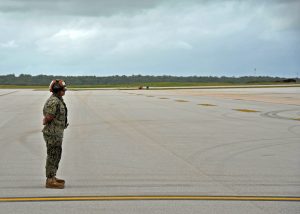In just a few months, COVID-19 has spread across the Indo-Pacific, infecting thousands and causing massive social and economic disruption. While some states, like South Korea and Vietnam, have had great success in containing the pandemic, others like India, Indonesia, and, of course, the United States continue to face substantial domestic outbreaks. COVID-19 will likely have a range of significant effects on Indo-Pacific security and geopolitics in both the short and long-term.
In the near future, COVID-19 will degrade military readiness in the Indo-Pacific. Militaries across the region have had to forfeit large-scale training exercises that help maintain readiness. The U.S. and South Korea canceled their regular joint exercises earlier this year. The U.S. and the Philippines similarly called off the annual Balikatan exercises in May. Australia recently canceled the multinational Pitch Black exercises, which would have included the U.S., South Korea, Japan, and other regional powers. In general, lower levels of readiness across the region will increase the risk of international accidents and incidents involving military forces. The cancellation of so many joint U.S.-allied exercises may also lead U.S. allies and adversaries alike to question whether the U.S. armed forces remain able to meet the United States’ extensive security commitments in the Indo-Pacific.
The pandemic may also lead to greater instability on the Korean Peninsula in the near term. North Korea already faces mounting economic difficulties as the result of international sanctions and the North’s decision to close its border with China, its largest trading partner, to prevent the spread of COVID-19. Should the coronavirus arrive in North Korea, the country will likely face an acute crisis given its poverty and poor healthcare infrastructure. A fragile North Korea could lash out aggressively in an attempt to distract its citizenry and secure concessions in the form of international humanitarian assistance. Already, North Korea has demolished its joint liaison office with the South near Kaesong in a dramatic show of force; the North will likely engage in further provocations in the months to come.
COVID-19 also may temporarily impede India’s growing role in Indo-Pacific regional security. Over the last decade, India has steadily shifted toward becoming a “net security provider” in the region, strengthening its naval capabilities, supporting maritime capacity-building efforts in Southeast Asia, and stepping up engagement in multilateral security dialogues like the “Quad.” Despite a draconian lockdown this spring, however, Indian COVID-19 cases are now rising rapidly. With an overburdened health care system and an economy still struggling from the earlier lockdown, the Modi administration may have no choice but to focus its attention and resources inward toward resolving these domestic challenges.
The pandemic will also have several long-term strategic impacts on regional security in the Indo-Pacific. Perhaps most importantly, COVID-19 is likely to intensify U.S.-China regional rivalry. For many in the United States, the pandemic highlights the costs of U.S.-China interdependence and the unreliability of the Chinese government. Many in China, in turn, view U.S. criticism of China as a cynical effort to distract from the U.S. government’s botched response to the pandemic. The mutual antagonism born out of the COVID-19 epidemic is likely to outlast the disease itself, contributing to growing strategic competition between the Indo-Pacific’s two most powerful states.
The coronavirus may also have a long-term impact on U.S. and Chinese regional influence and power. As the U.S. has struggled to contain the virus at home, its regional (and global) reputation has suffered. China, meanwhile, has leveraged assistance and propaganda to strengthen its soft power in developing states across the region. At the same time, China has taken advantage of regional states’ preoccupation with the coronavirus to increase its coercive efforts in contested territory in the South and East China Seas and along the Sino-Indian border while engaging in a protracted cyber offensive against Australia.
In the long run, COVID-19 is also likely to damage the legitimacy of the liberal international order in the Indo-Pacific. Leading international institutions have struggled to manage the outbreak. The G-7, for instance, was unable to even release a joint statement on the pandemic. Perhaps most notably, the World Health Organization (WHO) has seen its reputation damaged by its obsequiousness toward China and the U.S. decision to cut ties with the organization.
At the same time, the coronavirus may well contribute to the emergence of new regional institutions designed to tackle shared security challenges. The existing “Quad” states — the United States, India, Japan, and Australia — have teamed up with South Korea, Vietnam, and New Zealand in the “Quad Plus” dialogue to coordinate their responses to the coronavirus. This could pave the way for greater multilateral cooperation between these key regional stakeholders in the future on both transnational and traditional security issues.
Lastly, the COVID-19 pandemic will likely have a long-term impact on threat perceptions across the Indo-Pacific. States, facing the extensive damage caused by the coronavirus, are likely to take pathogenic security more seriously in the long-run. Already, polling data indicates that U.S. citizens see the spread of disease as the top global threat facing their country. It is unclear, however, whether Indo-Pacific states will rely on multilateral or unilateral strategies to address pathogenic security concerns. While the creation of the Quad Plus dialogue suggests that states may see multilateralism as a productive path forward, the U.S. split with the WHO simultaneously hints at the fragility of existing multilateral mechanisms for addressing transnational threats.
Dr. Jiyoon Kim is a senior research fellow of the Institute of Democracy and Education.
Dr. Jihoon Yu is a lieutenant commander in the ROK Navy working on naval strategy and force development at the ROK Navy HQ.
Dr. Erik French is an assistant professor of International Studies at SUNY Brockport.

































